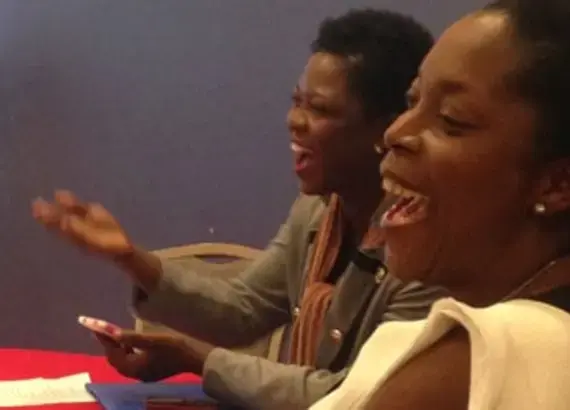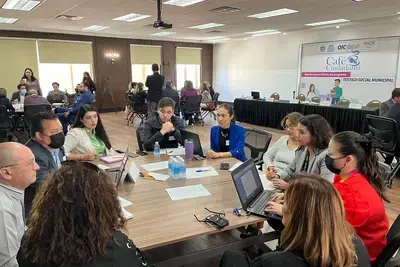
Success Story
New Generation of Women Leaders Take Local Office in Haiti
Rodely Carietane Balde sat down at a table of her peers with a flustered smile,“I was just inaugurated two days ago! I have a lot to do!” After a ten-month period of contestation after the election and a special investigation by election authorities, Balde had learned she would become mayor of Lascahobas in Haiti’s Centre department. Hearing the news of her election, Balde attended an NDI-hosted Political Leadership Academy in the Haitian capital of Port-au-Prince. The Academy enabled women mayors from around the country to come together and share solutions to common issues they faced during their campaigns and in the months since they took office.
Women have historically faced barriers to political participation in Haiti, including threats of violence and gender discrimination. While the 2015 elections saw a rise of women candidates for all levels of government and an increased percentage of women who went on to second-round elections, winning national office proved elusive. No women were elected to national office in Haiti’s 2015 legislative and presidential elections. Even though women struggle to win office at the national level, candidates at the local and municipal levels are gaining traction. Mayor Balde is one of 12 recently-elected women mayors who form a new generation of Haitian women leading at the local level.
After a 2013 gender parity law mandated that one-third of candidates at local and municipal levels be women, more women have entered these races than ever before. Women made up more than the mandated 30 percent of candidates for municipal elections in 2015, and a woman either leads or is co-mayor in every three-person mayoral group or “cartel” throughout the country. The women in these positions will play a major role in their communities, gaining leadership experience that can help them get elected to higher office.
Many of the newly-elected women mayors have never held elected office despite years of experience as activists and civil society leaders. To fill this gap, NDI provided the Political Leadership Academy training in August to help women and their co-mayors develop the skills they need to effectively manage their districts. During the Academy, the mayors also spoke about difficulties they faced during their campaigns and since taking office. Women who run for political office in Haiti frequently face threats of physical violence, discrimination, and a lack of funding or support by political parties. These challenges don’t end on election day. Within a month of taking office, Annelise Mocombe, mayor of the northern district of Borgne, found her office burnt down by political opponents. Because of the ongoing threat to her property and person, she and her co-mayors are struggling to find a landlord who will rent them space for their new offices. “The truth is we’re starting from zero in my commune,” she admitted.
Mocombe wasn’t just referring to office space. The other challenge these mayors face is what they have inherited after more than a year in which there were no elected mayors. When the terms of office expired for all Haitian mayors in February 2015 after four years of political gridlock and no elections, then-President Michel Martelly appointed interim mayors to lead the country’s 140 communes. The interim leaders left significant debt that the new mayors must now manage. The new mayors also inherited historically weak local public services, such as health, sanitation and other regulatory commissions, and security conditions that many highlight as their top policy priority to tackle while in office.
In spite of these challenges, the newly elected women mayors remain hopeful and committed to making change. “It’s not one of the highest posts, but it’s one of the noblest, because we are so close to the people,” explained one of the co-mayors in Lascahobas. One mayor detailed a plan to install a weekly market in her district. Several mayors plan on drawing visitors to natural resources such as waterfalls, beaches and caves, turning to ecotourism as a potential source of revenue. Mayor Balde, whose commune borders the Dominican Republic, aims to establish a commission to address tension between the two countries. The mayors’ agendas are varied and reflect a deep knowledge of the history and potential of these often neglected rural areas. One mayor described her commune in Kreyol, “Li twò rich poul pòv,” or “It’s just too rich to be poor.”
This training was made possible with funding from the Iris O’Brien Foundation.
Published on August 25, 2016



